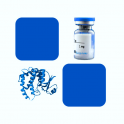
- Remove this product from my favorite's list.
- Add this product to my list of favorites.
Products
Viewed products
Newsletter
 |  |  |  |  |  |

Background
NKG2A/CD159a is a transmembrane protein belonging to the CD94/NKG2 family of C-type lectin-like receptors that inhibits innate immune system activation, also known as KLRC1, CD159a, NK cell receptor A and NKG2-A/NKG2-B type II integral membrane protein. NKG2A marks a unique immune effector subset preferentially co-expressing the tissue-resident CD103 molecule, but not immune checkpoint inhibitors. NKG2A blockade therapy operated through CD8 T cells, but not NK cells. The increase in NKG2A expression might be induced by IL-10, which was present at a high level in the plasma of HCC patients. Blocking IL-10 could specifically inhibit NKG2A expression in NK cells. These findings indicate that NKG2A expression is influenced by factors from cancer nests and contributes to NK cell exhaustion, suggesting that NKG2A blockade has the potential to restore immunity against liver tumors by reversing NK cell exhaustion.
Source
Recombinant Human NKG2A, Fc Tag (NKA-H526c) is expressed from human 293 cells (HEK293). It contains AA Pro 94 - Leu 233 (Accession # P26715-1).
Predicted N-terminus: Pro
Molecular Characterization
This protein carries a human IgG1 Fc tag at the N-terminus.
The protein has a calculated MW of 42.5 kDa. The protein migrates as 55-65 kDa under reducing (R) condition (SDS-PAGE) due to glycosylation.
Endotoxin
Less than 1.0 EU per μg by the LAL method.
Purity
>95% as determined by SDS-PAGE.
Formulation
Lyophilized from 0.22 μm filtered solution in Tris with Glycine, Arginine and NaCl, pH7.5. Normally trehalose is added as protectant before lyophilization.
Reconstitution
Please see Certificate of Analysis for specific instructions.
For best performance, we strongly recommend you to follow the reconstitution protocol provided in the CoA.
Storage
For long term storage, the product should be stored at lyophilized state at -20°C or lower.
Please avoid repeated freeze-thaw cycles.
This product is stable after storage at:
-20°C to -70°C for 12 months in lyophilized state;
-70°C for 3 months under sterile conditions after reconstitution.
(1) Sun C, et al. Oncoimmunology. 2016. 6(1):e1264562.
(2) McWilliams EM, et al. Oncoimmunology. 2016. 5(10).
(3) van Montfoort N, et al. Cell. 2018. 175(7):1744-1755.
Follow us